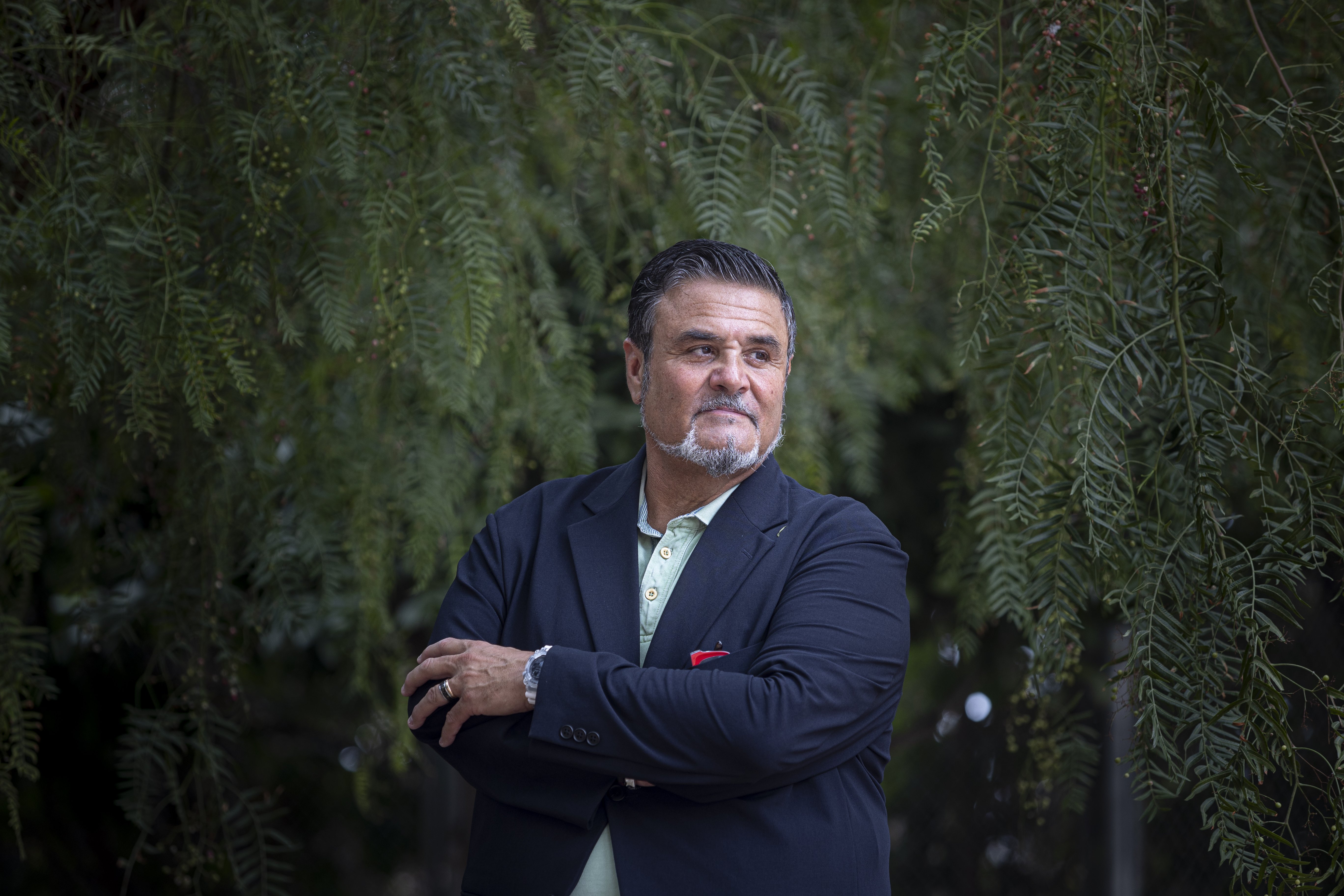"It seriously jolts you, inside. It's not pleasant. Last year was the first time I went there. I felt I was ready. What makes me happiest, and it gives me goosebumps to say it, is the people, like Robert and the lawyer and the entire UAVAT collective that we were able to create out of a misfortune. The support received is very important.” The words are from a young woman, who wishes to remain anonymous but wants to share how she experienced the 2017 terrorist attack in Barcelona at the age of 21, what she has been through since, and the feelings caused by the arrival of the fateful date, August 17th. Probably on this fifth anniversary she will be there again in the tribute to the victims, very respectful and without political interference, which is held every year on the Rambla, by the Joan Miró mosaic, the end of the trajectory for the murderous van driven by Younes Abouyaaqoub, a young man from Ripoll radicalized along with six other friends and a brother, and spurred on by the imam Abdelbaki Es Satty.
The group that this woman refers to is the one that brought together by the Unit for the Attention and Assessment of Victims of Terrorism (UAVAT), set up by Robert Manrique, a victim of the 1987 Hipercor attack, and the psychologist Sara Bosch, who created this professional service after seeing victims who were disoriented and not being given attention by the Spanish interior ministry, they say. The Barcelona city council, the Barcelona provincial council and the Catalan government have maintained funding to the UAVAT, to attend to those affected and to pay the experts to testify at the National Audience trial for the attack, at which the collective collaborated with the 11-M Association for Terrorism Victims, at which three men were accused and convicted of belonging to a terrorist group and manufacturing explosives, but not for the 16 murders in Barcelona and Cambrils, or the hundreds of wounded.
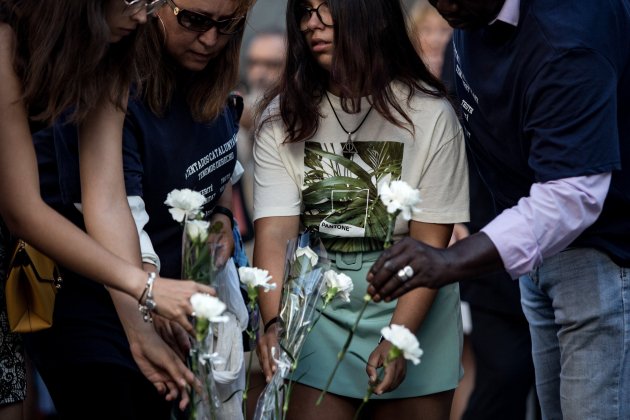
What they lived through on the Rambla
Also a part of the UAVAT community are Santi Colominas and his family, who, like others, lived through the attack on the Rambla, but have not been recognized by the Spanish administration as victims. "It is a date on which we lived through the most traumatic experience of our lives. We experienced it separately but it brought us together as a family. And in the perspective of these five years, there are still many doubts to be resolved", affirms Santi, who, the same as every year, will return to the Rambla this August 17th.
That afternoon of August 17th, 2017, Santi Colominas was having lunch at the Viena sandwich restaurant on Carrer Pelai, when his 14-year-old son Joan went to find him after leaving the hairdresser, where his mother and the other brother were. "The argument with his mother about whether or not he should go off up the street alone was what saved him", says Santi. The van passed by at 4:50pm, although his son did then experience the Dantesque landscape, with lifeless bodies scattered along the Rambla. It was minutes and hours of anguish for his family trying to find him, while Joan was alone on an empty lot in nearby Carrer Santa Anna, closed in, and where father and son were able to eventually touch each other's fingers through the fence. Separately they had found shelter, Santi in a sex shop with the shutters half down and with other people. The inferno ended that night, but the uncertainty and the thought that it could happen again, is lifelong. "We returned to the Rambla a few days after the attack. My wife is a tourist guide and the four of us went together and put the moment in place. On Instagram, Joan expressed his thanks for the luck we had had. We celebrate it and express our solidarity with our colleagues who have had a bad time. Joan has assimilated it well, but it is a burden that he will always carry", declares Santi.
No public health protocol for the victims
The case of the 21-year-old woman is appalling and probably also suffered by other victims: loneliness and incomprehension. She was working in a restaurant on the Rambla when the attack happened. Anxiety and stress and the premises filled up with tourists and others who were seeking shelter. She had to return alone, walking up the Rambla and seeing death at every step, to catch the train. She doesn't remember how she was able to make that journey.
"I had been a leader. Then I couldn't go to Barcelona, I saw it as a distant, dark place, I thought it could happen again... I quit my job, my studies at the UPC, I took a lot of medication and it was very difficult for me to go to class, they treated me very well at the university, they really did, but I couldn't continue. I was unable to be in any open or closed enclosure, I was in constant alert. I would come home and start crying, and neither my family nor my partner understood what was happening to me. I didn't know where to turn..." She explains that she went to her local health centre to seek psychological and psychiatric treatment for the trauma she suffered, and was assigned a visit to the psychologist - once every three months - and tablets.
It was she herself who gathered strength and demanded better treatment from the public health service, and in the end she found help via Catalan public television. Her aunt saw a TV interview with Robert Manrique about UAVAT and victims' rights, and called them. "They came to see me at home and explained everything to me, the psychologist and Domènec, the lawyer. It was very important for me, to see that someone cared about me", she remembers gratefully.
"It is something huge to overcome and the support you receive is very important, to feel that you are not alone", explains this resident of the Garraf county, who continues in treatment, but with the support received and her own efforts was able, two years after the attacks, to resume her studies and be able to get on the train again. It is an example of overcoming adversity. The Rambla, however, is a place she never goes, and the documentary 800 metres about the radicalized youths who committed the crimes, is something she still can't watch. Never mind. Attending the homage to the victims last August was a great milestone for her: "I so wanted to meet up with the lawyer, the psychologist Domènec... I didn't know anyone, but I wanted to go alone, without any family members accompanying me, and it was all hugs, it all went well. It was about not feeling alone."
"The authorities treat you as someone who is trying to fool them"
With assistance from UAVAT, the woman has been recognized as a victim of terrorism and has "severe post-traumatic stress as a sequel". The National Audience has recognized 177 victims.
"The bureaucracy makes you want to give up frequently. Time and again I had to present papers to my work, the ministry didn't give me psychological assistance either", she complains, adding: "Then I went to my local health centre, they referred me to the mental health centre, but they gave me an appointment once every three months and half an hour with the psychologist, I was in a terrible state and I asked for more help and they gave me a psychologist every week, which I still continue with today. I don't want to imagine the people who have not received any kind of treatment. With treatment, I've had such a bad time, I can't imagine the people who have lost a loved one".
Santi Colominas adds that he and his wife Sílvia sought to prevent their son Joan from going through this ordeal and the battle of the institutional bureaucracy, and more so when he was recovering well from the trauma he experienced. "There are victims who explain that they have been made to feel as if they are trying to fool the administration when they go and ask for help, or if they fit the criteria of the Victims of Terrorism Act, and some have even become angry because they weren't believed, despite providing evidence and videos to show they were there", explains Santi. Santi and his family feel like victims of the attacks, although they have not tried to claim that status after being refused the first time. He remembers that at the UAVAT he met Javier Martínez, the father of 3-year-old Xavi, murdered on the Rambla, who recounted how he was alone without knowing where to go until he found the UAVAT.
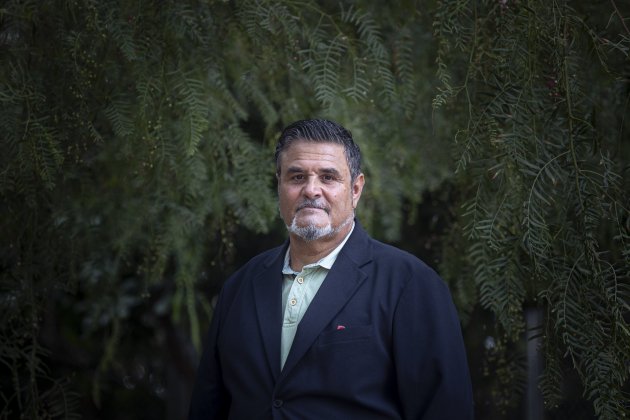
At this point in the conversation, Robert Manrique joins in and assures that there are certainly people who deceived the administration years ago by presenting themselves as victims of terrorism - for example, at the Hipercor attack - but he asks for "bravery" from the interior ministry to report those people, so the innocent do not pay for the sins of the guilty. "The ministry doesn't try to locate the victims, it waits for them to come forward and then if a year has gone by, they don't accept any cases," says Manrique bluntly.
What do the victims of terrorist attacks ask from the administrations, both the Spanish ministry and the Catalan Generalitat? "The person needs support, to be understood, which is very hard. How would the person on the counter act if this had happened to a family member? Sometimes I feel like a name without feelings or emotions. A number", the woman declares. And Santi adds: "The public good is important, but so is the individual good. If a person goes to ask for some help, they must not be made to feel disdained or under suspicion. You must have support and they must inform if you are entitled to benefits or not, you need support in the exercising of your rights, nothing more and nothing less."
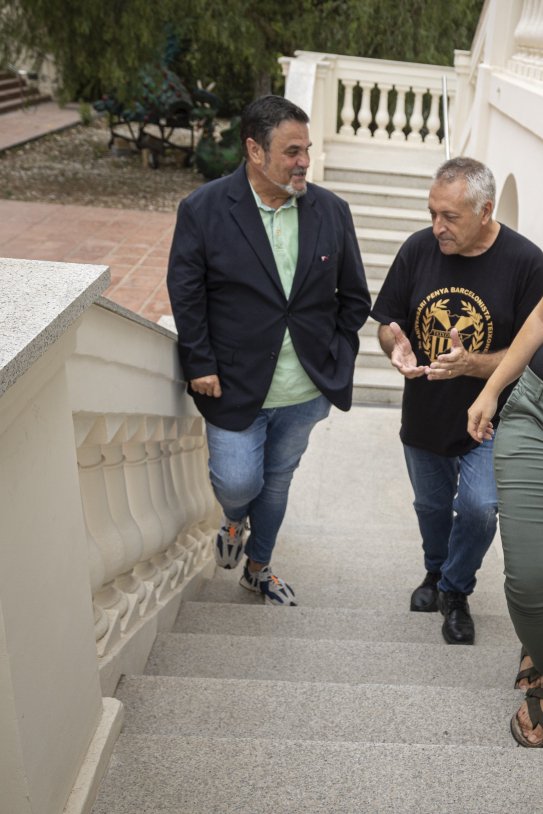
"We want it not to happen again"
Santi is also honest and says: "We all need answers: What went wrong that day? And more after all we have read, and the supposed vigilance that the leader of that [terrorist] group had, to make sure that there are no kids like those in Ripoll who someone is trying to radicalise. It is necessary to raise awareness among the entire population around them, as demonstrated by the documentary 800 metres, in which people saw changes in the boys but didn't see that it was such a major change. But when you see them in the videos, they show so little respect for life, that it makes you realise that they were not the same as a while before. The experiences people have been through must be used so that we react to the next one.”
72 victims recognized thanks to the UAVAT
The professional work of the UAVAT was confirmed in the 2021 sentence of the National Audience case, under presiding judge Fèlix Alfonso Guevara, which recognized 82 victims with post-traumatic stress, who had not previously been accepted by the Spanish state, or by the prosecutors and investigating judge in the case. The UAVAT, with the 11-M Association, succeeded in having 72 people (relatives of those who died, and people who were physically and psychologically injured) classified as victims, when the interior ministry had dismissed them.
Manrique explained that there are still around 238 victims who have not been located out of the more than 350 people included in the court sentence, who have not been located, despite the enormous work done by the unit and communication with embassies. These victims were included in the prosecution case, but in the UAVAT they are doubtful that all of these people know that they have the right to claim compensation. Manrique demands that the Catalan government speed up the passing of legislation in Catalonia for the care of victims of terrorism and an office to assist them, as most autonomous communities have - and all the more so, given the "disinterest" of the Spanish government."We have had terrorist attacks in Catalonia for 62 years, and we are the third Spanish community with the most victims. La Rioja has just passed a law and funded it", he recalls. Manrique has the spatial distribution of the Spanish and foreign victims of the attacks in Catalonia shown on maps.
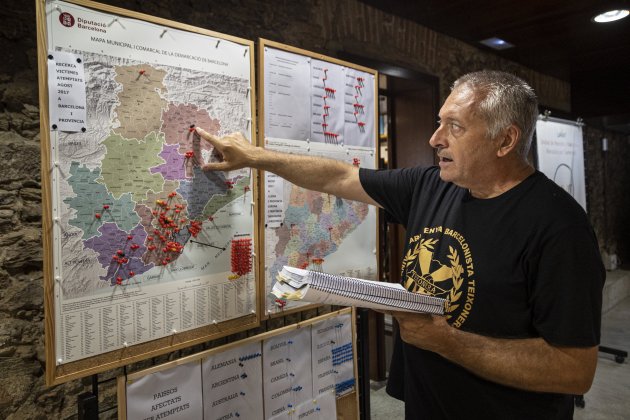
A group of strength and feeling
The UAVAT has created a large family, which gathers every August 17th on the Rambla to pay tribute to the victims who are not there and to share their pain and their triumphs over the obstacles. "It has become a group of opinion, strength and feeling, since we have all experienced it in different ways, but that 17th August has united us", affirms Santi. And the woman adds: "Yes, love and affection are very important for overcoming the barriers and for life. It is nice that you can share this experience by expressing yourself freely without prejudice or taboo, and that you are understood.” The two witnesses encourage those who need support not to hesitate to contact the UAVAT "because they are very professional, they will help you and they will let you do things yourself; each at their own speed and according to their needs".
And for the survivors, the August 17th event has a clear message: "We are here to feel strong, to come together and so that we don't forget that it can happen again", in the words of Santi. From the UAVAT, they underline that the victims must never be forgotten again.

